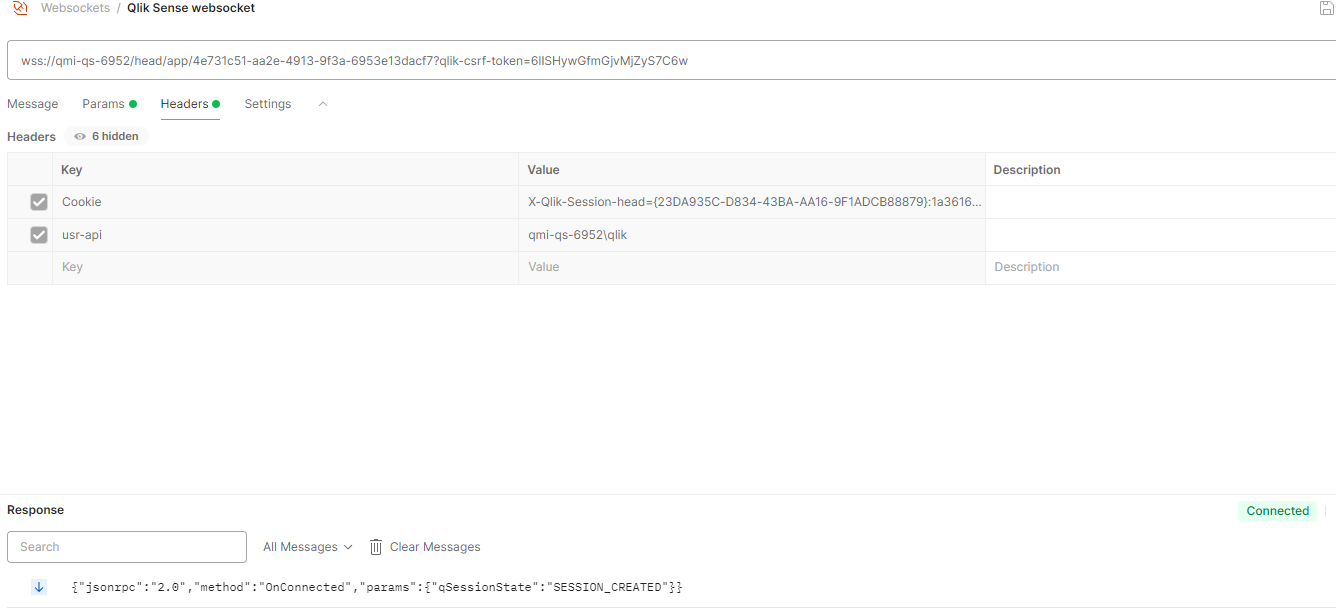Unlock a world of possibilities! Login now and discover the exclusive benefits awaiting you.
- Qlik Community
- :
- Forums
- :
- Analytics & AI
- :
- Products & Topics
- :
- Integration, Extension & APIs
- :
- how to connect to qsense web engine November 2024 ...
- Subscribe to RSS Feed
- Mark Topic as New
- Mark Topic as Read
- Float this Topic for Current User
- Bookmark
- Subscribe
- Mute
- Printer Friendly Page
- Mark as New
- Bookmark
- Subscribe
- Mute
- Subscribe to RSS Feed
- Permalink
- Report Inappropriate Content
how to connect to qsense web engine November 2024 ?
the java code below works fine with qlik sense version February 2024
URI serverUri = new URI("wss://serverqsense.domaine.fr/vproxyname/app/" + idApp + "?Xrfkey=ABCDEFGH123456");
with November 2024 I got error http 403 😞
any idea ?
thanks in advance
Philippe
Accepted Solutions
- Mark as New
- Bookmark
- Subscribe
- Mute
- Subscribe to RSS Feed
- Permalink
- Report Inappropriate Content
I've made some tests and with Ticket auth is working with steps made so far.
Using header auth, an extra step is required. When you call csrf API you will receive qlik csrf token param and a set Cookie in response headers. Grab that cookie value and attach to websocket headers. It should work.
Below an example of set cookie response header from csrf API and websocket connection:


- Mark as New
- Bookmark
- Subscribe
- Mute
- Subscribe to RSS Feed
- Permalink
- Report Inappropriate Content
Hey @PhilippeG , in Nov 2024 we introduced few changes at security levels. On of them is the CSRF token. This has to be added to websocket connection as url param.
When you are authenticated, you have to call a QPS APIs for getting the crsf token value, here the API doc.
Then, attach csrf token to websocket url like this: URI serverUri = new URI("wss://serverqsense.domaine.fr/vproxyname/app/" + idApp + "?Xrfkey=ABCDEFGH123456&qlik-csrf-token=_yourToken_");
Our docs is not up to date, I've raised this internally.
- Mark as New
- Bookmark
- Subscribe
- Mute
- Subscribe to RSS Feed
- Permalink
- Report Inappropriate Content
Hi @alex_colombo and thanks for your response !
However I still have the 403 error when opening websocket despite adding qlik-csrf-token :
I got qlik-csrf-token with this url :
https://serverqsense.domaine.fr/vproxyname/qps/csrftoken
and headers :
wsAppClient.addHeader("Xrfkey", "ABCDEFGH123456");
wsAppClient.addHeader("usr-api", "BB\\USERQLIKADM");
I got qlik-csrf-token and a value (j7kh4Y8fmPooKs7QDdfk8A) in response header : so far so good ?
then I call wsAppClient.connect() with URI("wss://serverqsense.domaine.fr/vproxyname/app/" + idApp + "?Xrfkey=ABCDEFGH123456&qlik-csrf-token=j7kh4Y8fmPooKs7QDdfk8A")
always got Status Code: 403 Forbidden
I notice something weird:
if I put a wrong value for domain/user for the "usr-api" key I still get a token.
Do you have another way to get past this 403 error?
- Mark as New
- Bookmark
- Subscribe
- Mute
- Subscribe to RSS Feed
- Permalink
- Report Inappropriate Content
Forgot to mention that you need to apply a modification into Virtual Proxy configuration. Go in VP configuration, click on Advanced, then Additional response headers.
You have to add below headers:
Access-Control-Allow-Credentials: true
Access-Control-Expose-Headers: qlik-csrf-token
- Mark as New
- Bookmark
- Subscribe
- Mute
- Subscribe to RSS Feed
- Permalink
- Report Inappropriate Content
I added this parameters in my QMC :
Access-Control-Allow-Credentials: true
Access-Control-Expose-Headers: qlik-csrf-token
in virtual proxy conf , but always 403 !!
I put some pic to illustrate my parameters...
Thanks to help me !
- Mark as New
- Bookmark
- Subscribe
- Mute
- Subscribe to RSS Feed
- Permalink
- Report Inappropriate Content
I've made some tests and with Ticket auth is working with steps made so far.
Using header auth, an extra step is required. When you call csrf API you will receive qlik csrf token param and a set Cookie in response headers. Grab that cookie value and attach to websocket headers. It should work.
Below an example of set cookie response header from csrf API and websocket connection:

